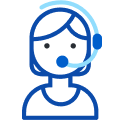A day in the life of online school for Cash and Brandi (mom and Learning Coach).
Favorite Subject(s)
Science
Hobbies
Archery
Why K12?
Brandi switched her children to online school after being a traditional homeschool family. They were looking for more rigorous curriculum as the kids got older and the flexibility to travel with their dad for work. Cash, the youngest, also has dyslexia and dysgraphia, and Brandi wanted to make sure he got the services he needed. Brandi saw the value of online school so much that she switched her teaching career to teaching at a K12-powered school once her kids were learning more independently.


Student Schedule
Learning Coaches typically spend between 4 to 6 hours each day with elementary school students like Cash, providing oversight.
Brandi set up her workspace near Cash's learning space, so she's nearby if he needs help. Being physically close lets her listen in to what he's doing as she's taking breaks from teaching her classes. The older kids are more independent but still stop by to have a paper proofread or a math problem explained.
Why did you switch to online school?

Curriculum
The number of classes students take varies per grade level and individual. For example, students in 5th grade, like Cash, typically take between 4–6 subjects each semester, with maybe 2–4 of those requiring scheduled, live classes.
In addition to core academic subjects like English, math, science, and social studies, K12-powered schools have a great selection of electives, including the advanced learner options Cash enjoys. The school also provides support services, such as occupational therapy and counseling.
Class schedules may vary considerably based on the individual student and their needs, their state, and any special programs
Why do you like online school?
What is it like doing school at home with your whole family? How do you navigate all that as the Learning Coach with three students?

How does your family stay social doing online school?

Teacher Support and Communication
Brandi saw the value of online school so much that she shifted her career to be a part of it. In addition to the help from her children's teachers, she can speak to the level of support as a 4th grade teacher at their school.
As an online teacher, Brandi gets creative with engaging assignments like a student favorite on strange animals. She can also pull her students into one-to-one sessions when they need extra help on a topic or into small group sessions in certain subjects. That additional personalized support helps her create an environment where all her students feel like they matter.
More Q & A with Brandi
Was there anything that surprised you about online school?
I was surprised that our family dinner conversations got better. Once the boys started online school, we discussed more about what they learned during the day. There was more curiosity from our end as parents and more interest in sharing from their end as students.
What was it specifically about K12-powered schools that made you choose that as the online learning option for your family?
The main thing for me was the curriculum. The K12-powered school gave us enough options for my children to take honors classes, advanced learner classes, and dual enrollment classes at the local college.
Plus, they offered all the support services we were looking for to help Cash with his dyslexia and dysgraphia.

First Name

Other Stories You Might Like

First Name

Learning with K12
Learning with K12
K12 powers a wide variety of educational options. including tuition-free public schools and tuition-based private schools. See what's available in your area.
These are the stories of real students attending K12-powered schools and their families. Content is a combination of direct quotes and summaries from in-person interviews. Their stories each reflect their experiences at their respective schools. Actual experience can vary by student and school. These pages are designed to reflect a typical day in the life of a student attending an online K12-powered school. Individual class schedules and requirements will vary by state, school, and the individual needs of each student.





